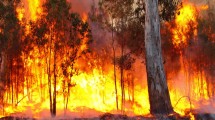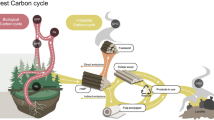Abstract
A broad assessment is given of the contentions that plantation forests are high consumers of water, increase acidification, sustain a low diversity of wildlife, and store more carbon than do unmanaged forests. The following conclusions are drawn: (1) Evapotranspiration from planted forest monocultures is greater than from short vegetation, as a result of greater interception loss. Water loss from conifer forests is usually greater than from deciduous hardwoods, but evapotranspiration from Eucalyptus in the dry tropics is often no greater than from native hardwoods. (2) Compared to short vegetation, forests can significantly increase the transfer of acidifying pollutants from the air to the soil and surface waters, and conifers are more likely to enhance acidification than are hardwoods. (3) There are normally sufficient plantation management options available to make most plantation landscapes the homes of a rich diversity of flora and fauna. (4) An area covered with a plantation managed for maximum volume yield will normally contain substantially less carbon than the same area of unmanaged forest.
Similar content being viewed by others
References
Benecke, P. 1976. Soil water relations and water exchange of forest ecosystems. Ecol. Stud. 19: 101–131.
Bibby, C.J., Phillips, B.N. and Sneddon, A.J.E. 1986. Birds of restocked conifer plantations in Wales. J. Appl. Ecol. 22: 619–633.
Bosch, J.M. and Hewlett, J.D. 1982. A review of catchment experiments to determine the effect of vegetation changes on water yield and evapotranspiration. J. Hydrol. 55: 3–23.
Bull, E.L. and Meslow, E.C. 1977. Habitat requirement of the pileated woodpecker in northeastern Oregon. J. For. 75: 335–340.
Calder, I.R. 1990. Evaporation in the Uplands. John Wiley and Sons, Chichester, England.
Calder, I.R. 1992. Water use of eucalypt - a review, pp. 167–179. In: Calder, I.R., Hall, R.L. and Adlard, P.G. (Eds) Growth andWater Use of Forest Plantations. JohnWiley and Sons, Chichester, England.
Cannell, M.G.R. 1989. Physiological basis of wood production: A review. Scand. J. For. Res. 4: 459–490.
Cannell, M.G.R. 1995. Forests and the global carbon cycle in the past, present and future. Research Report No 3. European Forest Institute, Joensuu, Finland.
Cannell, M.G.R., Dewar, R.C. and Thornley, J.H.M. 1992. Carbon flow and storage in European forests, pp. 256–271. In: Teller, A. and Jeffers, J.N.R. (Eds) Responses of Forest Ecosystems to Environmental Changes. Elsevier Applied Science, London and New York.
Cape, J.N. and Brown, A.H.F. 1986. The effects of different tree species on the amount and chemical composition of precipitation passing through the canopy. Report to the U.K. Department of Environment. Institute of Terrestrial Ecology, Edinburgh, United Kingdom.
Colquhoun, I.J., Ridge, R.W., Bell, D.T., Loneragan, W.A. and Kuo, J. 1984. Comparative studies in selected species of Eucalyptus used in rehabilitation of the northern jarrah forest, western Australia. I. Patterns of xylem pressure potential and diffusive resistance of leaves. Aust. J. Bot. 32: 367–373.
Cooper, C.F. 1983. Carbon storage in managed forests. Can. J. For. Res. 13: 155–166.
Crossley, A., Wilson, D.B. and Milne, R. 1992. Pollution in the upland environment. Envirn. Pollut. 75: 81–88.
Dewar, R.C. 1991. Analytical model of carbon storage in the trees, soils and wood products of managed forests. Tree Physiol. 8: 239–258.
Duyzer, J. and Fowler, D. 1994. Modeling land atmosphere exchange of gaseous oxides of nitrogen in Europe. Tellus 46B: 353–372.
Elton, C.S. 1966. The Patterns of Animal Communities. Methuen, London.
Evans, H.G. 1987. Sitka spruce insects: Past, present and future. In: Henderson, D.M. and Faulkner, R. (Eds) Sitka spruce. Proc. R. S. Edinburgh 93B: 157–168.
Fowler, D., Cape, J.N. and Unsworth, M.H. 1989. Deposition of atmospheric pollutants on forests. Philos. Trans. R. S. London 324B: 247–265.
Fowler, D., Duyzer, J.H. and Baldocchi, D.D. 1991. Inputs of trace gases, particles and cloud droplets to terrestrial surfaces. Proc. R. S. Edinburgh 97B: 35–59.
Gash, J.H.C. and Shuttleworth, W.J. 1991. Tropical deforestation: Albedo and the surface energy balance. Clim. Chang. 19: 123–133.
Gholz, H.L., Fitz, F.K. and Waring, R.H. 1976. Leaf area differences associated with oldgrowth forest communities in the western Oregon Cascades. Can. J. For. Res. 6: 49–57.
Greenwood, E.A.N., Klein, L., Beresford, J.D. and Watson, G.D. 1985. Differences in annual evaporation between grazed pasture and Eucalyptus species in plantations on a saline farm catchment. J. Hydrol. 78: 261–278.
Haartman, von, L. 1971. Population dynamics, pp. 391–459. In: Farner, D.J. and King, J.R. (Eds) Avian Biology (volume 1). Academic Press, London.
Harding, R.J. 1992. The modification of climate by forests, pp. 332–346. In: Calder, I.R., Hall, R.L. and Adlard, P.G. (Eds) Growth and Water Use of Forest Plantations. John Wiley and Sons, Chichester, England.
Harmon, M.E., Ferrell, W.K. and Franklin, J.F. 1990. Effects on carbon storage of conversion of old-growth forests to young forests. Sci. 247: 699–702.
Herwitz, S.R. 1985. Interception storage capacities of tropical rainforest canopy trees. J. Hydrol. 77: 237–252.
Hibbert, A.R. 1967. Forest treatment effects on water yield, pp. 527–543. In: Sopper, W.E. and Lull, H.W. (Eds) Forest Hydrology. Proceedings of an International Symposium on Forest Hydrology. Pergamon Press, New York.
Hill, M.O. 1979. The development of a flora in even-aged plantations, pp. 175–192. In: Ford, E.D., Malcolm, D.C. and Atterson, J. (Eds) The Ecology of Even-aged Forest Plantations. Institute of Terrestrial Ecology Edinburgh, United Kingdom.
Hill, M.O. 1987. Opportunities for vegetation management in plantation forests, pp. 64–69. In: Good, J.E.G. (Ed) Environmental Aspects of Plantation Forestry in Wales. Institute of Terrestrial Ecology, Edinburgh, United Kingdom.
Hill, M.O. and Wallace, H.L. 1989. Vegetation and environment in afforested sand dunes at Newborough, Anglesey. For. 62: 249–267.
Hornung, M., Le-Grice, S., Brown, N. and Norris, D. 1990. The role of geology and soils in controlling surface water acidity in Wales, pp. 55–66. In: Edwards, R.W., Gee, A.S. and Stoner, J.H. (Eds) Acid Waters in Wales. Kluwer, Dordrecht.
Jarvis, P.G. 1985. Transpiration and assimilation of tree and agricultural crops: The “omega factor”, pp. 460–480. In: Cannell, M.G.R. and Jackson, J.E. (Eds) Trees as Crop Plants. Institute of Terrestrial Ecology, Edinburgh, United Kingdom.
Jarvis, P.G. and McNaughton, K.G. 1985. Stomatal control of transpiration. Adv. Ecol. Res. 15: 1–49.
Jarvis, P.G. and Stewart, J. 1979. Evaporation of water from plantation forest, pp. 327–349. In: Ford, E.D., Malcolm, D.C. and Atterson, J. (Eds) The Ecology of Even-aged Plantations. Institute of Terrestrial Ecology, Edinburgh, United Kingdom.
Johnson, D.W. 1992. Effects of forest management on soil carbon storage. Water, Air, Soil Pollut. 64: 83–120.
Kennedy, C.E.J. and Southwood, T.R.E. 1984. The number of species of insects associated with British trees: A re-analysis. Anim. Ecol. 53: 455–478.
Korner, C., Scheel, J.A. and Bauer, H. 1979. Maximum leaf diffusive conductance in vascular plants. Photosynthetica 13: 45–82.
Kreiser, A.M., Appleby, P.G., Natkanski, J., Rippey, B. and Batterbee, R.W. 1990. Afforestation and lake acidification: A comparison of four sites in Scotland. Philos. Trans. R. S. London 327B: 377–383.
Ladefoged, K. 1963. Transpiration of forest trees in closed stands. Physiol. Plant. 10: 378–414.
Maitland, P.S., Newson, M.D. and Best, G.A. 1990. The Impact of Afforestation and Forestry Practice on Freshwater Habitats. Nature Conservancy Council, Peterborough, United Kingdom.
Margules, C. and Usher, M.B. 1981. Criteria used in assessing wildlife conservation potential: A review. Biol. Conserv. 21: 79–109.
Mayer, R. and Ulrich, B. 1978. Input of atmospheric sulphur by dry and wet deposition to two Central European forest ecosystems. Atmos. Envirn. 12: 375–377.
Meslow, E.C. and Wight, H.M. 1975. Avifauna and succession in Douglas-fir forests in the Pacific Northwest, pp. 266–271. In: Management of Forest and Range Habitats for Non-game Birds. USDA Forest Service, USDA Forest Service, General Technical Report WO-1. Washington, DC.
Monteith, J.L. 1981. Evaporation and surface temperature. Q. J. R. Meteorol. Soc. 107: 1–27.
Newton, I. and Moss, D. 1981. Factors affecting the breeding of sparrowhawks and the occurrence of their song-bird prey in woodlands, pp. 125–131. In: Last, F.T. and Gardiner, A.S. (Eds) Forest and Woodland Ecology. Institute of Terrestrial Ecology, Edinburgh, United Kingdom.
Nutter, W.L. 1979. Effects of plantations on the quantity, quality and timing of water supplies, pp. 351–367. In: Ford, E.D., Malcolm, D.C. and Atterson, J. (Eds) The Ecology of Even Aged Plantations. Institute of Terrestrial Ecology, Edinburgh, United Kingdom.
Nys, C., Stevens, P.A. and Ranger, J. 1990. Sulphur nutrition of forests examined using a sulphur budget approach, pp. 356–372. In: Harrison, A. F., Ineson, P. and Heal, O.W. (Eds) Field Methods, Applications and Interpretation. Elsevier Applied Science, New York.
Ormerod, S.J., Donald, A.P. and Brown, S.J. 1989. The influence of plantation forestry on the pH and aluminium concentration of upland Welsh streams: A re-examination. Envirn. Pollut. 62: 47–62.
Penman, H.L. 1967. Evaporation from forests: a comparison of theory and observation, pp. 373–380. In: Sopper, W.E. and Lull, H.W. (Eds) Forest Hydrology. Proceedings of an International Symposium on Forest Hydrology. Pergamon Press, New York.
Rochelle, J.A. and Bunnell, F.L. 1979. Plantation management and vertebrate wildlife, pp. 389–411. In: Malcolm, D.C. and Atterson, J. (Eds) The Ecology of Even-aged Forest Plantations. Institute of Terrestrial Ecology, Edinburgh, United Kingdom.
Rose, F. 1974. The epiphytes of oak, pp. 270–273. In: Morris, M.G. and Perring, F.H. (Eds) The British Oak. Classey, Faringdon, United Kingdom.
Stanhill, G. 1986. Water use efficiency. Adv. Agron. 39: 53–85.
Stoner, J. and Gee, A.S. 1985. Effects of forestry on water quality and fish inWelsh rivers and lakes. J. Inst. Water Eng. Manag. 39: 27–45.
Swank, W.T. and Douglass, J.E. 1974. Streamflow greatly reduced by converting deciduous hardwood stands to pine. Sci. 185: 857–859.
Swank, W.T. and Milner, N.H. 1968. Conversion of hardwood-covered watersheds to white pine reduces water yield. Water Resour. Res. 4: 947–954.
Thomas, J.W., Miller, R.J., Black, H., Rodiek, J.E. and Maser, C. 1976. Guidelines for maintaining and enhancing wildlife habitat in forest management in the Blue Mountains of Washington and Oregon. Trans. North Am. Wildl. Nat. Resour. Conf. 41: 452–476.
Welch, R.C. 1986. What do we know about insects in Scottish woods, pp. 95–100. In: Jenkins, D. (Ed) Trees and Wildlife in the Scottish Uplands. Institute of Terrestrial Ecology, Edinburgh, United Kingdom.
Whitehead, D. and Jarvis, P.G. 1981. Coniferous forests and plantations, pp. 49–152. In: Kozlowski, T.T. (Ed) Water Deficits and Plant Growth (volume VI). Academic Press, London.
Author information
Authors and Affiliations
Rights and permissions
About this article
Cite this article
Cannell, M.G.R. Environmental impacts of forest monocultures: water use, acidification, wildlife conservation, and carbon storage. New Forests 17, 239–262 (1999). https://doi.org/10.1023/A:1006551018221
Issue Date:
DOI: https://doi.org/10.1023/A:1006551018221




